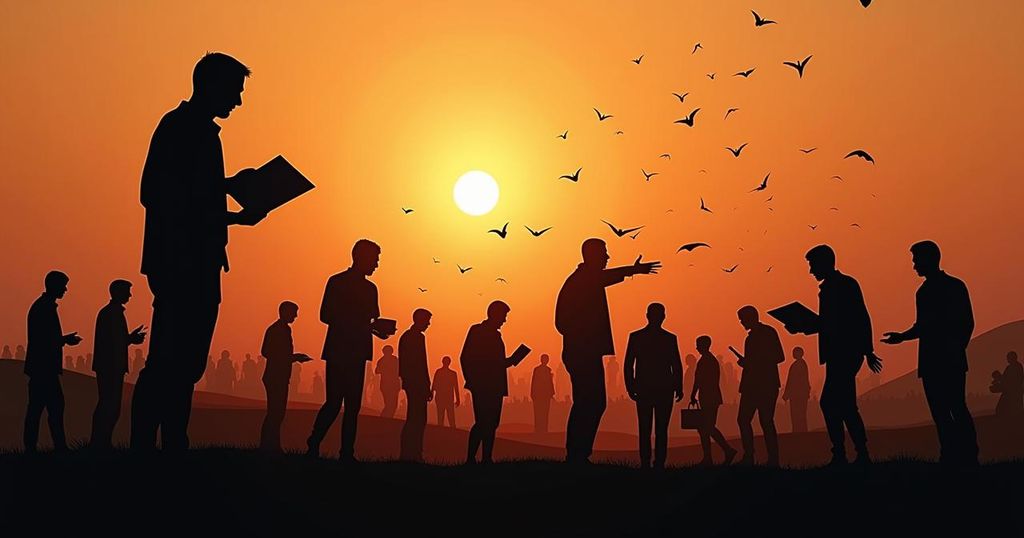The approaching presidential election in Tunisia highlights a stark decline in democratic engagement, marked by President Kais Saied’s abusive consolidation of power since his 2021 coup. The absence of public campaigning, the imprisonment of political rivals, and the exclusion of credible candidates demonstrate a determined effort to maintain authoritarian rule. Despite this, growing public dissent and protests indicate a collective desire for a return to democracy, making the upcoming election a significant moment in Tunisia’s political landscape.
A visitor to Tunisia would likely be unaware that a presidential election is scheduled for October 6. The vibrant political atmosphere that characterized previous elections has vanished, replaced by an oppressive silence imposed by President Kais Saied. Following his 2021 coup, which dismantled the democratic processes that had been established post-revolution, Saied has systematically consolidated power while his popularity plummets. Gone are the lively debates, campaign rallies, and public engagement that marked Tunisia’s elections from 2011 to 2019. Instead, Saied’s administration has curtailed media freedoms, imprisoned dissenters, and disallowed the competition that democracy requires. The absence of televised debates—once a hallmark of electoral engagement—highlights this stark regression. Despite riding to power on promises to fulfill the aspirations of the Tunisian revolution, Saied has betrayed those ideals. His actions have led to a substantial contraction of political and civic space, with his regime resorting to arbitrary arrests and imprisonments. This climate of fear has discouraged many potential candidates from entering the race, with those who dared to challenge Saied’s authority facing imprisonment or exclusion through legal manipulation. As election day approaches, dissent is met with repression; notable political figures and opposition candidates have been silenced, including Ayachi Zammel, who remains incarcerated yet is symbolically present on the ballot. The electoral commission, under Saied’s influence, has refused to acknowledge legitimate candidacies, further tainting the election’s credibility. International observers, previously an essential facet of Tunisian elections, will not be present this year, effectively galvanizing concerns about the electoral process’s legitimacy. Lahab Al-Jid’s analysis reveals that what was anticipated as a simple procedural vote appears instead to solidify Saied’s autocratic grip on power. Despite Saied’s attempts to appear legitimate, widespread discontent has reignited public protests across the capital. This indicates a persistent desire to reclaim Tunisia’s democratic framework and push back against authoritarian rule. Activists and opposition groups are clamoring for a renewed commitment to democracy, demonstrating that citizens remain resolute in their efforts to hold their government accountable.
The context of the upcoming Tunisian election is heavily influenced by political developments post-2011, including the 2011 revolution that led to democratization efforts. Kais Saied, a law professor with no prior political background, was propelled to the presidency in 2019. However, his subsequent actions—most notably the July 25, 2021 coup—have eroded the democratic gains achieved in previous years. This coup marked a significant pivot away from democratic practices, leading to increased crackdowns on political opposition and media freedoms. The political climate has since been characterized by arrests of dissenters, suppression of political expression, and legal machinations aimed at eliminating legitimate political competition. Consequently, this election is significant not only for its immediate implications for the future of Tunisia but also for reflecting the broader struggles for democracy and the rule of law in the region.
In conclusion, the upcoming presidential election in Tunisia symbolizes a critical juncture in the country’s political history. President Kais Saied’s consolidation of power has dismantled the democratic processes that once flourished, leading to a climate of fear and repression. As opposition movements grow and public protests surge, it is evident that a significant portion of the Tunisian populace remains committed to restoring democratic governance. This election, overshadowed by Saied’s authoritarian tactics, will not provide the legitimacy he seeks; instead, it may catalyze a renewed struggle for democracy among the people of Tunisia.
Original Source: www.middleeasteye.net






